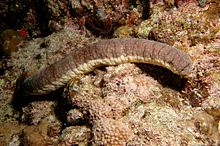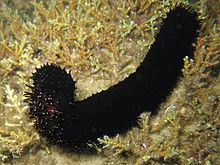
1798 (MDCCXCVIII) was a common year starting on Monday of the Gregorian calendar and a common year starting on Friday of the Julian calendar, the 1798th year of the Common Era (CE) and Anno Domini (AD) designations, the 798th year of the 2nd millennium, the 98th year of the 18th century, and the 9th year of the 1790s decade. As of the start of 1798, the Gregorian calendar was 11 days ahead of the Julian calendar, which remained in localized use until 1923.

Sea cucumbers are echinoderms from the class Holothuroidea. They are marine animals with a leathery skin and an elongated body containing a single, branched gonad. They are found on the sea floor worldwide. The number of known holothurian species worldwide is about 1,786, with the greatest number being in the Asia-Pacific region. Many of these are gathered for human consumption and some species are cultivated in aquaculture systems. The harvested product is variously referred to as trepang, namako, bêche-de-mer, or balate. Sea cucumbers serve a useful role in the marine ecosystem as they help recycle nutrients, breaking down detritus and other organic matter, after which bacteria can continue the decomposition process.

Cucumaria is a genus of sea cucumbers.

Actinopyga is a genus of sea cucumbers found in coastal waters in tropical and temperate regions.

Cucumariidae is a family of sea cucumbers, marine animals with elongated bodies, leathery skins and tentacles that are found on the sea bed.

Bohadschia is a genus of sea cucumbers in the family Holothuriidae. They are among the largest, most common, and conspicuous sea cucumbers on coral reefs. They have large, loaf-like bodies that are often strikingly colored.
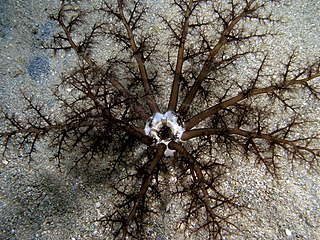
Phyllophoridae is a family of sea cucumbers, marine invertebrates with elongated bodies, leathery skins and feeding tentacles.

Stichopus is a genus of sea cucumbers from the family Stichopodidae.
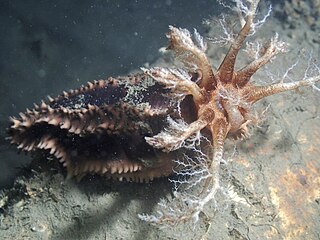
Ocnus is a genus of sea cucumbers in the family Cucumariidae.

Labidodemas is a genus of marine sea cucumbers in the family Holothuriidae. The genus was erected by Emil Selenka in 1867.
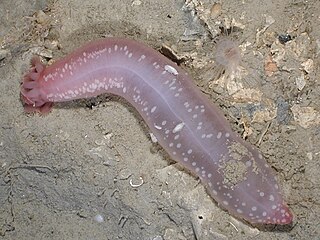
Chiridota is a genus of sea cucumbers in the family Chiridotidae. It is an extant genus but some fossil species are known.

Psolus is a genus of sea cucumbers in the family Psolidae, marine animals with long bodies, leathery skins and tentacles, that inhabit the sea bed.

Trachythyone is a genus of sea cucumbers in the family Cucumariidae.

Thyone is a genus of sea cucumbers in the family Phyllophoridae.

Mesothuria is a genus of sea cucumbers belonging to the family Mesothuriidae. The genus has a cosmopolitan distribution.




